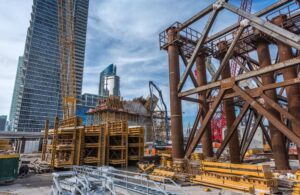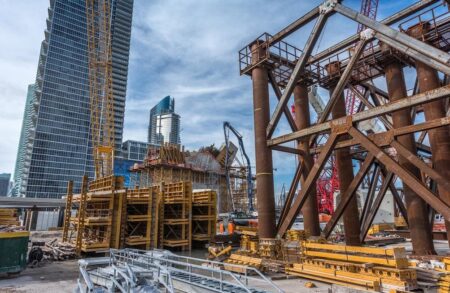Georges Berberi, President at SAMFET.
Vision 2030, the epicenter of some of the most ambitious construction projects, is reshaping Saudi Arabia’s economy and identity, moving the country toward a future of sustainability, innovation and infrastructure. As someone who’s worked on large-scale projects around the globe, I can confidently say that what’s happening in Saudi Arabia is unlike anything we’ve seen before. For those of us fortunate enough to contribute to this transformation, the opportunities are incredible, but so are the challenges.
Here are a few lessons I’ve learned from my experience on the ground and advice for anyone looking to be part of this historic moment.
1. Seek out opportunities to contribute.
When I first heard about projects like Neom and the Red Sea Global Project, I couldn’t help but feel a mix of excitement and curiosity. But after spending time in Saudi Arabia, meeting the people driving these initiatives and witnessing the progress firsthand, I’ve realized the vast opportunity for businesses.
For businesses looking at this opportunity, it’s important to recognize the potential of getting in early. Look at what happened with Dubai—companies that positioned themselves before the boom became long-term players in a global business hub. I believe Saudi Arabia is presenting a similar trajectory, and those who wait too long may risk missing out on major contracts.
Even if your business isn’t directly in construction or hospitality, there’s room to contribute. Massive projects require logistics, technology, sustainability solutions and supply chain expertise. Consider expanding your thinking beyond your immediate sector, and may find unexpected opportunities to add value.
2. Understand the culture of the market.
Saudi Arabia is a unique market, and success can depend on more than technical expertise. It’s about building relationships, earning trust and respecting the local way of doing business.
One thing I’ve learned is that Saudis value loyalty and integrity. Once you prove that you’re reliable and can deliver on your promises, opportunities open up. But trust doesn’t come overnight—it’s earned through consistent performance and genuine partnerships.
In our early projects, we focused on getting every detail right—even beyond what was required. That approach paid off, leading to long-term partnerships that wouldn’t have happened otherwise. In Saudi Arabia, and in any relationship-driven market, patience and commitment matter more than just securing a contract.
For business leaders looking to enter, the best way to build credibility is by showing commitment to the region. This could mean hiring local talent, investing time in understanding business norms or forming joint ventures. Attending industry events and engaging with government and business leaders also signals that you’re here for the long term.
3. Understand the scale of projects.
The projects under Vision 2030 aren’t developments with a couple of hotels or a shopping mall. We’re talking about entire cities, with infrastructure, luxury accommodations, entertainment districts and sustainable technologies all integrated into a single vision.
Having worked on large-scale projects like Wynn Las Vegas and Hudson Yards in New York, I thought I’d seen it all. But the scale of projects, combined with tight timelines, of Vision 2030 sets a whole new standard.
Many companies underestimate what it takes to work at this scale. It’s not just about managing a bigger budget—it’s about coordinating thousands of moving parts, often across multiple countries. A single project could involve architects in London, engineers in Dubai and suppliers from Italy, all working under extreme deadlines. Make sure that you are prepared for this level of complexity. Otherwise, you may struggle to keep up.
4. Be ready when resource competition arises.
One of the biggest hurdles in Saudi Arabia is the competition for resources. With so many massive projects running simultaneously, there’s constant pressure on the supply chain and labor market.
With developments requiring premium materials and top-tier talent, companies that don’t plan ahead can face delays and rising costs. For example, securing high-quality materials like stone or millwork can be challenging, especially when every project wants the best. That’s where experience and relationships come into play.
During a previous project, our long-standing relationships helped us access in-demand materials that other companies couldn’t secure, keeping us on schedule while competitors faced months-long delays. The lesson here is clear: Continuously strengthen your supplier relationships to navigate resource shortages with ease.
5. Prioritize sustainability in your strategies.
I’ve found that Vision 2030 aims to create destinations that respect and enhance the natural environment. For companies working in this space, sustainability is a requirement. Businesses must use eco-friendly materials to minimize construction impacts. Moreover, leaders must familiarize themselves with the Kingdom’s green goals. This focus on sustainability is becoming a key factor in winning contracts. The developers behind these mega-projects are prioritizing partners who bring innovative green solutions. Companies that can integrate sustainability at the core of their business—not just as an afterthought—will be more competitive.
6. Success Requires Innovation And Flexibility
As with any project, you have to be ready for the unexpected. There’s little room for error with tight timelines, high standards and logistical challenges demanding constant innovation. For us, that meant adopting modular construction techniques, leveraging advanced technology, and building teams that could pivot quickly when plans changed.
It’s also about having the right mindset. In a market like this, flexibility and problem-solving are just as important as technical skills. Consider investing in tech-driven project tracking so that teams across multiple countries can adapt in real time. This kind of agility is critical when working at the scale and pace required by Vision 2030.
Looking Ahead
Vision 2030 is more than an economic transformation—it’s a cultural one, and Saudi Arabia can offer you a front-row seat to history in the making. With 63% of the population under 30, there’s an energy and optimism in the Kingdom that’s contagious. For those willing to embrace the challenges and opportunities, remember that being part of this transformation comes with great responsibility.
Forbes Business Council is the foremost growth and networking organization for business owners and leaders. Do I qualify?
Read the full article here











